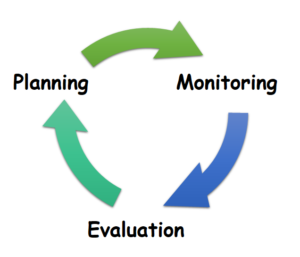What is metacognition? The plan-monitor-evaluate cycle
Have you ever wondered what the most successful students do differently from other students? Students who have developed effective ways of learning have mastered a skill called metacognition. In simple terms, metacognition is understanding your own thinking and learning processes. In other words, it is “thinking about your thinking”. Metacognitive skills include planning your learning, monitoring whether your current learning strategies are successful, and evaluating results of your learning. Improving your metacognitive skills is associated with increased success in all of your academic life.
How do you gain the skill of metacognition? One way to think about developing metacognition is gaining the ability to plan, monitor, and evaluate your learning.

The Learning Cycle (Image Credit: Christina Page)
Planning involves two key tasks: deciding what you need to learn, and then deciding how you are going to learn that material.
Monitoring requires you to ask “how am I doing at learning this?”. In monitoring, you are constantly tracking what you have learned, what you don’t yet know, and whether your study strategies are helping you to learn effectively.
Evaluation involves reflection on how well you met your Learning Objectives after completing a unit of study, or receiving feedback (such as a test or assignment).
Key Questions to Improve Your Learning
At each stage in the learning cycle, there are key questions that you will ask yourself to support your learning process. In the chart below, you will identify the key question for each stage in the cycle, along with the other questions you will want to consider.
| Key question | Other questions to ask yourself |
| What do I need to learn? (Planning) | - What are the Learning Objectives for this class?
- What do I already know about this topic?
- What are the concepts I need to master before my next test?
- What do I want to learn about this topic?
- How do I distinguish important information from the details?
|
| How am I going to learn the material? (Planning) | - How can I integrate textbook reading with lecture notes?
- What active learning strategies will support my learning?
- Will I study alone or with a study group?
- What charts or visuals will help me reorganize or process this material?
- What memory strategies can I use to remember key words and concepts?
- How can I connect with my instructor in office hours?
|
| How am I doing at learning this material? (Monitoring) | - What concepts do I understand well?
- What concepts are still confusing for me?
- Can I explain the material to someone else without referring to notes?
- Can I create and answer self-testing questions about these concepts?
- What other strategies could I use to learn this material?
- Am I using the supports available to me (e.g. office hours, tutors)?
- How can I make this material more personally relevant to me?
|
| Did I learn the material effectively? (Evaluation) | - To what extent did I meet the Learning Objectives for this unit?
- What in my exam preparation worked well?
- What in my exam preparation did not go well? What do I want to change?
- How did my exam answer compare with the suggested answer? What key components did I miss?
- How will what I have learned help me in my next courses?
|
Try it!
Two key questions in the Planning phase of learning are: (1) What do I already know about this topic? and (2) What do I want to learn? In this exercise, you will apply these two questions to your knowledge about learning strategies.
Download a printable worksheet for this exercise.
| What do I already know about learning strategies for university? | What do I want to know about learning strategies? |
| | |


